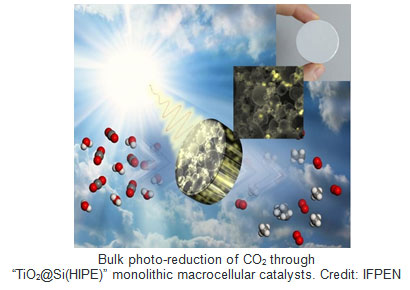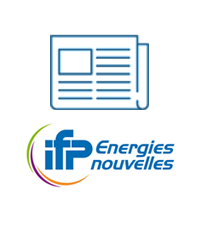14.01.2019
5 minutes of reading
Researchers from the French National Center for Scientific Research (CNRS), the University of Bordeaux and IFP Energies nouvelles (IFPEN) have developed new catalytic materials capable of effectively harvesting the photons from solar irradiation.
Their research, which has been patented1, has just been published in the scientific journal Advanced Functional Materials.
This work paves the way for a considerable reduction in the footprint of “solar fuel” production systems, and is set to redirect research in the field of photo-active systems, even beyond CO2 conversion.
Energy production from sunlight represents an option with considerable potential when it comes to tackling today’s climate and energy imperatives. The idea is to convert CO2 into fuel using solar irradiation, which is inexhaustible and abundant. The benefit is two-fold since it combines a remediation component (greenhouse gas management) with the production of energy molecules from non-fossil resources.
To achieve this, the scientific community is working on the development of catalytic processes capable of reproducing natural photosynthesis, in which carbon dioxide and water are converted into dioxygen and carbohydrates under the effect of sunlight.
Among the challenges associated with the development of systems capable of effectively capturing sunlight is the problem of footprint. Existing photocatalysts are systematically configured in two-dimensional cells/reactor (thin layer) form, which, in reality, results in the use of considerable surface areas. However, while solar energy is abundant and free, extensive areas of non-cultivable land are limited.
Teams from the Paul Pascal Research Center (CNRS/University of Bordeaux) and IFP Energies nouvelles worked to produce bulk photo-active materials. This enables the conversion of CO2within the volume of the catalyst, thereby selectively producing fuels such as methane and ethane. The resulting monocellular materials have the property of acting as veritable photonic sponges since they substantially increase the penetration of the photons within their structure, enabling an improvement in performance of at least one order of magnitude.
With these original and promising results, the researchers hope to generate interest within the scientific community concerning the preparation of new generations of three-dimensional photo-active systems in applications ranging from the photovoltaic sector to photo-proteolysis, via the photo-purification of air.
1 Sophie Bernadet, Antoine Fécant, Serge Ravaine, Denis Uzio, Rénal Backov.
French Patents 2017 : FR3065651, FR3065650, FR3065649.

Publication
Sophie Bernadet, Eugénie Tavernier, Duck-Min Ta, Renaud A. L. Vallée, Serge Ravaine, Antoine Fécant, Rénal Backov, Bulk Photo-Driven CO2 Conversion through TiO2@Si(HIPE) Monolithic Macrocellular Foams. Advanced Functional Materials.
>> DOI: 10.1002/adfm.201807767
Researchers contacts
Rénal Backov, CRPP-UMR CNRS 5031, Université de bordeaux
Tel. : 00 1 617 258 7093 - backov@crpp-bordeaux.cnrs.fr - backov@mit.edu
Antoine Fécant, IFP Energies nouvelles, Etablissement de Lyon
Tel. : 00 33 4 37 70 23 05 - antoine.fecant@ifpen.fr
About
The Centre national de la recherche scientifique (CNRS) is the leading public-sector research center in France and Europe. It conducts scientific, technological and societal research in a number of areas: mathematics, physics, information and communication science and technology, nuclear and particle physics, planetary sciences and sciences of the universe, chemistry, life sciences, human and social sciences, environment and engineering.
IFP Energies nouvelles (IFPEN) is a major research and training player in the fields of energy, transport and the environment. From research to industry, technological innovation is central to all its activities, hinged around three strategic priorities: sustainable mobility, new energies and responsible oil and gas.
University of Bordeaux. A major French higher education establishment, the University of Bordeaux won the Initiatives of Excellence award in 2016, and is now positioned alongside some of Europe’s leading universities with around 56,000 students and more than 3,000 faculty members and researchers.






